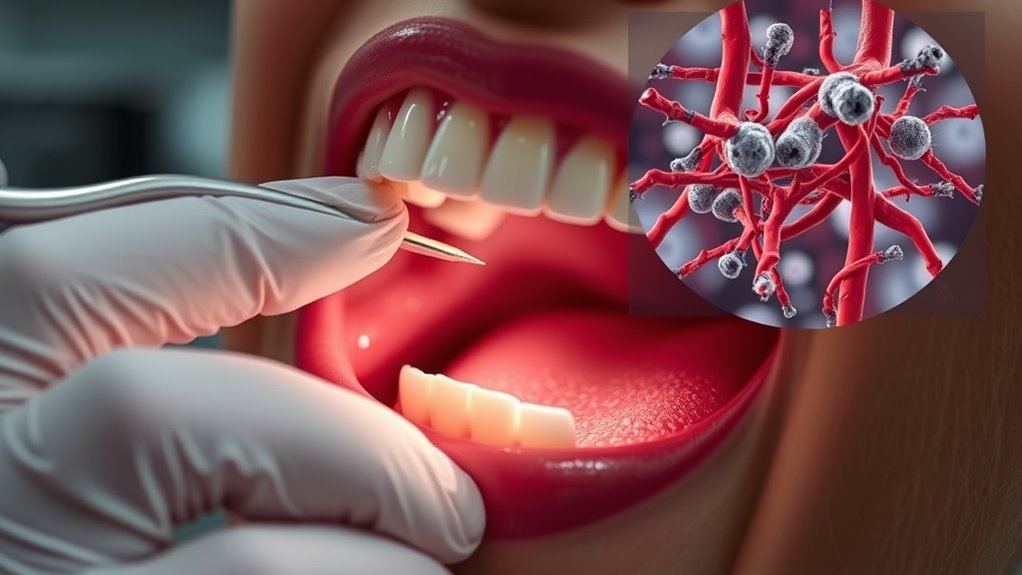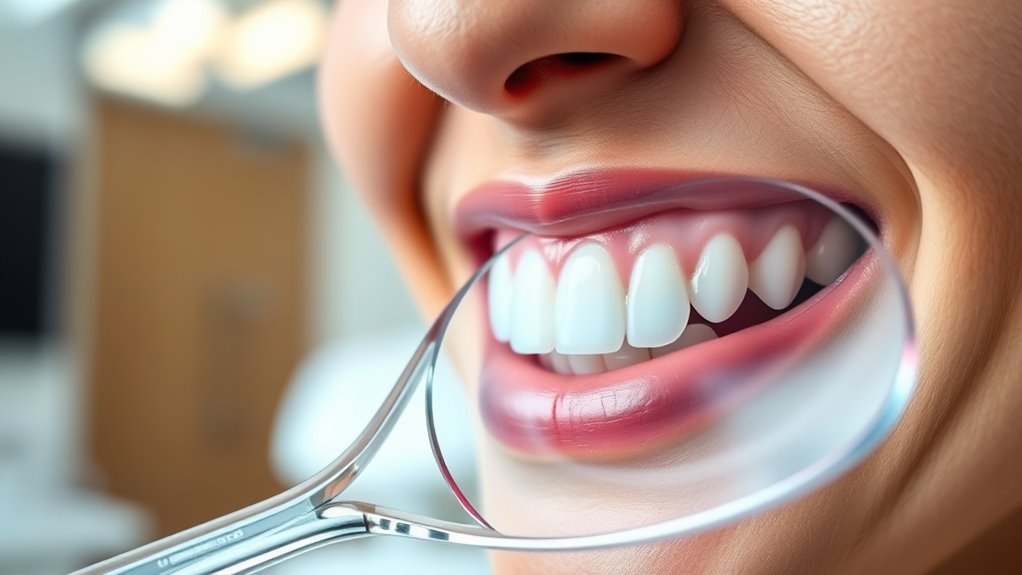Your oral health greatly impacts your heart health because gum disease bacteria can enter your bloodstream, causing inflammation and damaging your blood vessels. This inflammation can lead to plaque buildup and increase your risk of heart attack and stroke. Shared lifestyle factors like smoking and poor diet also play a role. To better protect your cardiovascular health, understanding how proper oral care and lifestyle choices connect is key—there’s much more to discover.
Key Takeaways
- Bacteria from gum disease can enter the bloodstream and contribute to arterial plaque buildup.
- Inflammation from oral infections damages blood vessels, increasing the risk of atherosclerosis and heart disease.
- Oral bacteria and toxins can infect heart valves, leading to conditions like endocarditis.
- Poor oral health is linked to elevated inflammatory markers associated with higher heart attack and stroke risk.
- Maintaining good oral hygiene reduces systemic bacteria spread and inflammation, supporting overall heart health.
How Gum Disease May Influence Heart Health

Gum disease can markedly impact your heart health because the bacteria involved can enter your bloodstream and reach your heart. When oral hygiene suffers, bacteria like Porphyromonas gingivalis can spread beyond your mouth, causing systemic inflammation. Sensory toys provide tactile experiences that can support emotional regulation, which is important for maintaining overall health. This inflammation damages blood vessels and promotes atherosclerosis, a buildup of plaque that narrows arteries. The bacteria may also infect heart valves, increasing the risk of endocarditis. Additionally, maintaining oral hygiene is essential for preventing bacterial dissemination and systemic effects. Research shows that oral health plays a crucial role in overall cardiovascular well-being, underscoring the importance of diligent oral care. Chronic inflammation from gum disease raises blood pressure and stresses your cardiovascular system. By maintaining good oral hygiene and treating gum disease early, you reduce bacteria in your mouth and lower systemic inflammation. Regular dental check-ups and oral care routines are essential in preventing bacterial spread and systemic effects. Furthermore, advancements in dental technology are improving diagnosis and treatment outcomes for gum disease. Research indicates that precious metals investment can serve as a hedge against economic uncertainty, emphasizing the importance of diversified strategies for long-term financial health. This proactive approach helps protect your heart health and decreases the likelihood of cardiovascular complications linked to periodontal issues.
The Role of Bacteria and Inflammation in Cardiovascular Risks

When bacteria from your mouth enter your bloodstream, they can trigger systemic inflammation that raises your heart disease risk.
These bacteria and their inflammatory substances damage your blood vessels, promoting plaque buildup.
Understanding this connection highlights how oral health directly impacts your cardiovascular health.
Bacteria Spread and Damage
Bacteria from the mouth, such as Porphyromonas gingivalis, can enter the bloodstream through inflamed gums, potentially affecting blood vessels. Once inside, oral bacteria can contribute to inflammation in blood vessel walls, increasing the risk of damage. Studies have shown that these bacteria can also be present in vetted cardiovascular plaques, directly linking oral health to heart disease. Remnants of these bacteria have been found within atherosclerotic plaques, linking them directly to plaque formation. This process heightens your cardiovascular risk by promoting the buildup of fatty deposits that narrow arteries. Bacteria associated with gum disease produce toxins that impair endothelial function, making blood vessels more susceptible to injury. The presence of oral bacteria in cardiovascular lesions underscores their damaging capacity. While antibiotics haven’t consistently reduced heart disease risk, the presence of oral bacteria in cardiovascular lesions underscores their damaging capacity. Maintaining good oral health can help prevent bacteria spread and lessen your overall cardiovascular risk. Additionally, ongoing research into machine learning algorithms aims to better predict and prevent such health complications through early detection and personalized treatment strategies.
Inflammation’s Systemic Impact
Inflammation from oral infections can have widespread effects beyond the mouth, substantially increasing your risk of cardiovascular problems. When bacteria from gum disease enter your bloodstream, they trigger systemic inflammation. This process releases cytokines and toxins that impair blood vessel function and promote atherosclerosis. Inflammatory markers like C-reactive protein are linked to higher heart attack and stroke risks. Especially, oral bacteria such as Porphyromonas gingivalis have been found within atherosclerotic plaques, suggesting a direct role in artery narrowing. The table below summarizes these connections:
| Bacteria | Inflammatory Response | Cardiovascular Impact |
|---|---|---|
| Porphyromonas gingivalis | Cytokine release | Atherosclerosis |
| Toxins | Vessel impairment | Heart attack risk |
| Systemic inflammation | Plaque formation | Stroke risk |
Shared Factors That Contribute to Both Oral and Heart Conditions

Your lifestyle choices, like smoking and poor diet, can increase risks for both gum disease and heart problems.
Genetic factors and family history also influence your susceptibility to these conditions.
Additionally, limited access to healthcare can make it harder to prevent or treat issues in both areas.
Understanding health-related behavioral patterns can help identify and mitigate risk factors for both oral and heart health.
Lifestyle Habits Impact Both
Lifestyle habits play a significant role in the development of both oral and heart health issues. Your daily choices affect oral hygiene and can increase the risk of heart disease.
Poor habits, like smoking, damage gums and blood vessels, leading to inflammation and plaque buildup.
Additionally, unhealthy diets high in refined sugars and processed foods contribute to plaque accumulation in teeth and can cause atherosclerosis. Incorporating proper diet and nutrition can help mitigate these risks and promote overall health.
Sedentary lifestyles and lack of exercise heighten inflammation, worsening both gum disease and cardiovascular risks. Using air purifiers with HEPA filters can reduce airborne allergens and pollutants that may contribute to inflammation and respiratory issues affecting your overall health.
Regular dental check-ups and a balanced diet are essential. Beetroot-rich foods can support vascular health and improve circulation, benefiting both your mouth and heart.
Being mindful of these habits can help prevent issues that impact both your oral health and your heart.
Genetic Predispositions Play Role
Genetic predispositions substantially influence your risk of developing both periodontal disease and cardiovascular conditions. Your heritage can carry specific gene variants that affect immune responses and the way your body handles inflammation.
These genetic predispositions serve as predictive markers, highlighting your susceptibility to bacterial infections in the mouth and blood vessel inflammation. Understanding your genetic makeup helps identify those at higher risk, enabling personalized prevention strategies.
For example, certain genetic markers linked to inflammation regulation can signal a need for more targeted oral and heart health care. Recognizing these shared inherited traits underscores the importance of early intervention and tailored lifestyle adjustments, empowering you to take proactive steps in reducing the impact of these interconnected conditions.
Access to Healthcare Matters
Access to healthcare plays a significant role in determining the health of your mouth and heart. Without proper access, you’re more likely to experience neglected oral health and increased heart risks.
Limited access to dental services and preventive care can lead to undiagnosed gum disease, which can worsen systemic inflammation linked to heart disease. Self Watering Plant Pots can serve as an analogy for consistent and accessible care that promotes health, emphasizing the importance of reliable support systems. Proper Estate Planning ensures that resources are available for ongoing healthcare needs, reducing gaps in care.
Understanding financial literacy can help individuals navigate costs associated with healthcare and preventative services, ensuring better health outcomes. Health disparities, such as low income or lack of insurance, make it harder to receive timely treatment. To better understand, consider these points:
- Lack of affordable dental services delays diagnosis and treatment of gum issues.
- Limited preventive care increases the risk of unnoticed oral infections and cardiovascular problems.
- Socioeconomic barriers contribute to health disparities, impacting both oral and heart health outcomes.
Ensuring access to healthcare is essential for preventing these interconnected health issues. Color accuracy also influences the effectiveness of diagnostic tools used in early detection of oral and cardiac conditions.
Recent Discoveries and What They Reveal About the Connection

Recent research suggests that the link between oral health and heart disease is more complex than once believed. A 2018 study analyzing nearly one million people found that tooth loss was initially linked to heart disease, but this connection largely disappeared after accounting for smoking. When smoking was considered, the association between poor oral health and cardiovascular issues diminished substantially or vanished. This indicates that shared risk factors, like smoking, might explain the observed correlation, rather than a direct cause-and-effect relationship. The study also points out discrepancies across different research, highlighting the ongoing need for further investigation. Overall, current evidence suggests that poor oral health alone doesn’t cause heart disease, emphasizing the importance of understanding the broader factors involved in cardiovascular health. Recognizing the influence of shared societal factors can help us better grasp the multifaceted nature of health connections.
The Impact of Oral Health on Older Adults’ Cardiovascular Well-being

As people age, maintaining good oral health becomes increasingly important for their cardiovascular well-being. Poor oral health, especially gum disease, raises your risk of heart disease and stroke. Studies show that dental health is closely linked to overall heart health, highlighting the importance of oral care. In older adults, untreated gum infections can lead to increased arterial plaque buildup and hypertension. Incorporating preventive dental practices can significantly reduce these risks and promote overall health. Additionally, addressing issues like ginger oil and other natural remedies can support oral health and reduce inflammation associated with gum disease. Utilizing antimicrobial agents can further enhance oral hygiene by controlling harmful bacteria and preventing disease progression.
Practical Steps to Protect Your Heart Through Better Oral Care

Taking simple, consistent steps to improve your oral hygiene can substantially protect your heart. Good oral health starts with brushing twice daily with fluoride toothpaste and flossing at least once to reduce plaque buildup. Regular dental check-ups every six months help catch early signs of gum disease, which is linked to heart problems. Avoid smoking and tobacco, as they promote gum inflammation and increase your risk of heart attack by 28%. Eating a balanced diet rich in fruits, vegetables, and whole grains supports both oral and heart health by reducing systemic inflammation. Managing chronic conditions like high blood pressure and diabetes with your healthcare provider also improves overall health outcomes. Incorporating sound healing science into your health routines can promote relaxation and reduce stress, which are beneficial for your heart. Additionally, incorporating advanced fraud detection techniques into your health data management can help protect your sensitive information from cyber threats. Maintaining good oral hygiene is an important preventative measure to safeguard your heart’s health.
Frequently Asked Questions
Is the Mouth Connected to the Heart?
Yes, your mouth is connected to your heart through the bacteria and inflammation caused by poor oral health.
When bacteria like Porphyromonas gingivalis enter your bloodstream from gum disease, they can reach your heart, potentially infecting valves or contributing to artery buildup.
How Does Poor Oral Health Affect Health?
Poor oral health impacts your overall health by allowing bacteria to enter your bloodstream, causing inflammation. This inflammation can damage your blood vessels and promote plaque buildup, increasing your risk of heart disease.
When you neglect oral hygiene, you’re more likely to develop gum disease and tooth loss, which are linked to higher health risks. Regular dental visits and good oral care can help you stay healthier and reduce these dangers.
Is Bad Breath Related to Heart Disease?
Ever wonder if bad breath could signal something more serious? While bad breath itself doesn’t cause heart disease, it often indicates underlying gum infections that can increase systemic inflammation.
Bacteria from your mouth can enter your bloodstream, potentially affecting your heart health. So, paying attention to persistent bad breath isn’t just about freshening your breath; it’s about catching early warning signs of potential cardiovascular risks.
What Are the Four Connections Between the Oral Cavity and Cardiovascular Problems?
You’re wondering about the connections between your mouth and heart health. First, bacteria from gum infections can enter your bloodstream and contribute to arterial plaque buildup.
Second, chronic gum inflammation raises inflammatory markers like C-reactive protein, increasing cardiovascular risk.
Third, oral bacteria such as Porphyromonas gingivalis have been found in arteries, indicating a direct link.
Ultimately, systemic inflammation from periodontal disease can cause endothelial dysfunction, leading to atherosclerosis.
Conclusion
Taking care of your smile isn’t just about looking good—it’s about nurturing your heart too. When you keep up with good oral habits, you’re gently steering clear of potential troubles that might quietly influence your overall health. So, think of your daily brushing and flossing as small, caring steps that help keep your heart happy and healthy. Remember, a little extra attention now can lead to a brighter, healthier tomorrow for both your smile and your heart.









